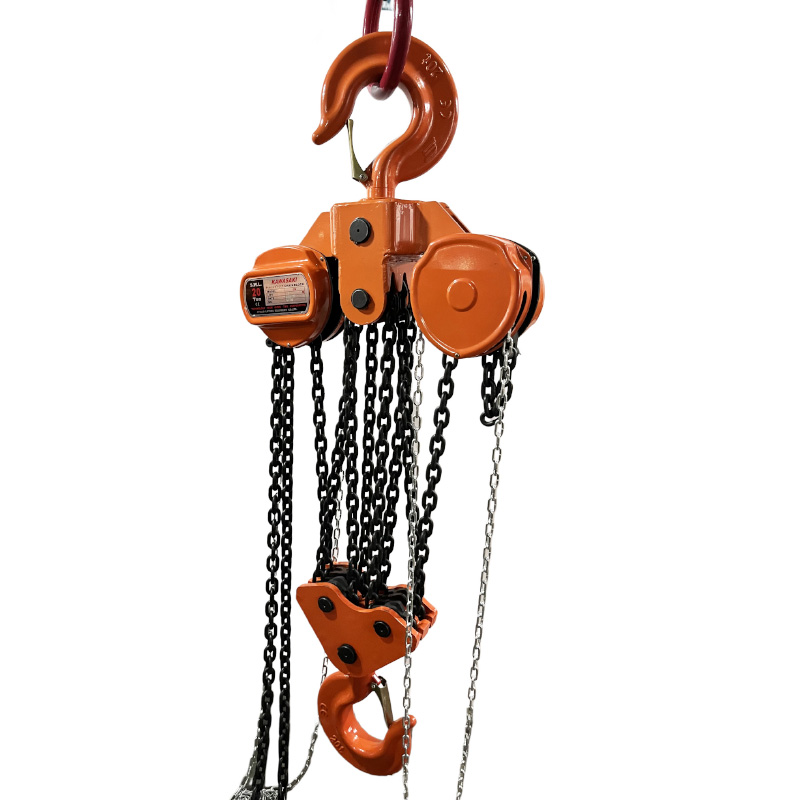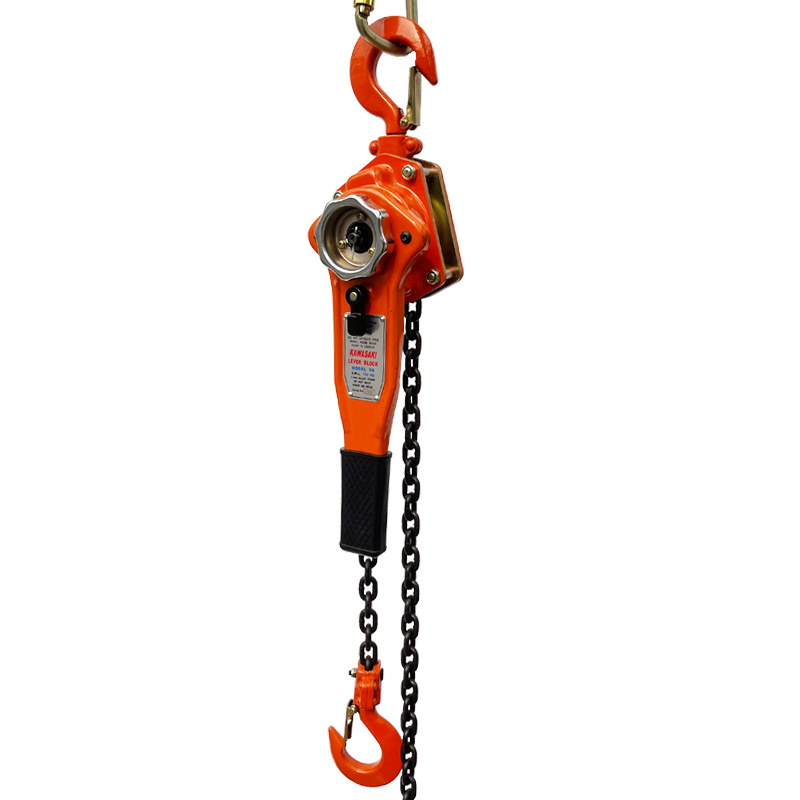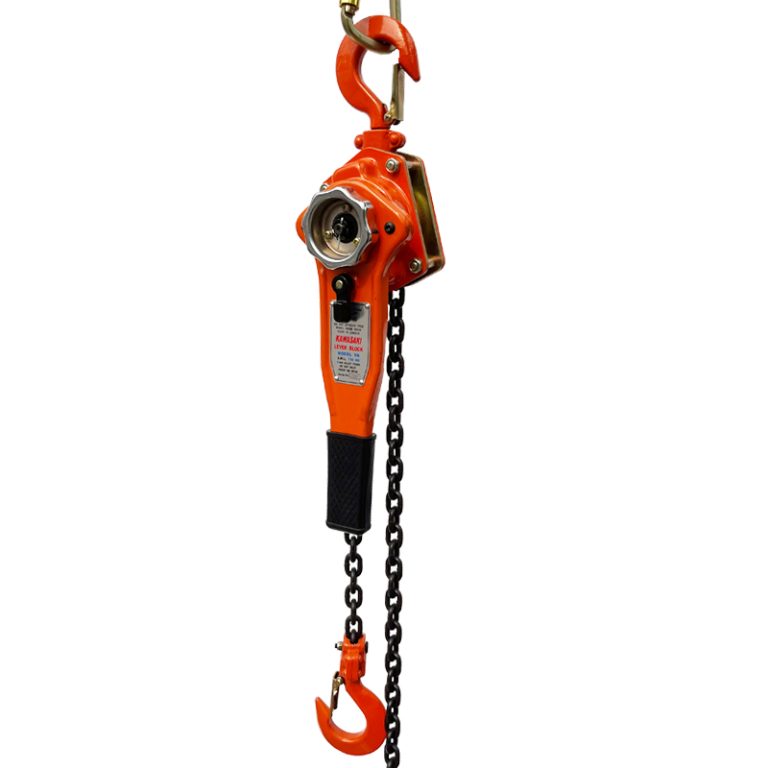So in using lever hoist technology in industry, it is important to know the basic operational principles and applications of these hoists. Lever hoists, which operate without electricity and are portable, are suitable for fast lifting and precise load positioning.
Lever Hoist Technology in Industrial Applications
Lever hoist is an obvious league of gantry cranes that has been an enormous help in industrial applications by providing efficient and multilateral methods of lifting or pulling heavy loads up to several carats or tons. Because of their efficiency and versatility, these tools are critical components in industries like construction, manufacturing, and logistics. These tools are the most reliable and versatile everywhere in all types of industries like construction, manufacturing, and logistics.
What Are the Key Features of Lever Hoists?
In addition, lever hoists also come with some features that make them user-friendly. They are portable, compact and well optimized for light weight, so you can use them in tight places. With their ratchet and pawl arrangement, these offer a great deal of control over the load positioning, an important feature when dealing with light operations.
Once it comes to lever hoists, the materials are often the finest quality alloy steel which helps to increase the durability and decrease the risk of wear and tear. Most units come with overload protection mechanisms that will protect users from causing any accidents while in use.
Why Choose APOLLO Lever Hoists for Industry Needs?
APOLLO lever hoists are unlike the competition and they represent the diversity of quality in the market, which is why they have proved to be successful in the industry. These products are manufactured under stringent quality assurance measures and are ensured to meet global standards.
In addition to lean production, scale production, fast delivery, and other production and processing capacity, APOLLO as a whole also provides customizable products in its range of lever hoist, with regards of material, such as T80/T100 chains, surface treatment (e.g. electroplating or oxidation + passivation), and various packaging options by customer market analysis. This level of adaptability ensures businesses can find solutions that meet their exact operational requirements.
Enhancing Efficiency with Lever Hoists
Lever hoists not only simplify lifting tasks but also significantly improve operational efficiency in industrial settings.
How Do Lever Hoists Streamline Lifting Operations?
Out of all the benefits one can gain through the use of a lever hoist, the most notable is how they can simplify the lifting of heavy objects. Workers can operate the mechanism on/around a simple lever to lift or pull loads, without the need for auxiliary motors. This makes them a great choice for where there is no electricity supply or far away from mains.
The precision control offered by lever hoists minimizes the risk of damage to materials being lifted. Additionally, their portability allows them to be easily transported across worksites, reducing downtime and enhancing productivity.
Safety Advantages of Lever Hoists in Industrial Settings
Safety is paramount when handling heavy loads in industrial environments. Lever hoists play a crucial role in minimizing risks associated with lifting operations.
How Do Lever Hoists Minimize Risks During Heavy Lifting?
Lever hoists come with a series of safety features that help prevent accidents while performing heavy lifting jobs. While providing embedded mechanisms that prevent an operator from pushing past the machine limits and constructing all components durable enough to withstand the stresses encountered in the operating environment.

The braking systems in modern lever hoists provide secure load holding even during unexpected stops. Additionally, features like anti-slip handles enhance grip and control, further reducing the risk of mishandling.
How Does APOLLO Demonstrate Commitment to Safety Standards?
Safety is a top priority for APOLLO’s product designs. All lever hoists are fully factory performance tested and manufactured to stringent safety criteria. These tests are conducted to determine lifting capacity, how performance stacks up in conditions to be encountered, and how stable a rig is during normal operation.
Quality system certification of ISO9001, and European Community CE/GS safety certifications, prove the company’s customer-oriented concept of producing safe, reliable, and lifting solutions. APOLLO’s lever hoist products are the perfect solution with high productivity and your workforce welfare. With APOLLO’s range of lever hoist products, you not only invest in efficiency but also in your workforce.
Selecting the Right Lever Hoist for Specific Tasks
Factors to Consider When Choosing a Lever Hoist
Load Capacity and Application Type
Load capacity is one of the most important factors to consider when choosing a lever hoist. Since lever hoists are made for different weight capacity limits, it is important to ensure that the hoist you choose is well-suited for the job at hand. So if your project involves large machinery or equipment in the air to manoeuvre, your hoist should have a higher load rating. On the other hand, a not very big operation needs fewer duty hoists only.
Another important factor that influences the right lever hoist is the type of application. The KAWASAKI MANUAL HOIST CHAIN HOIST CK 20T combines rugged performance with a total conventional load capacity of up to 20 tons, making it ideal for tough industrial applications.
Environmental Conditions and Material Compatibility
Since lever hoists are used in different working environments, environmental conditions probably determine the performance and life of a lever hoist. For example, if the hoist will operate in a corrosive or wet environment, corrosion-resistant materials such as stainless steel or special coatings must be used. Certain models come with stainless steel chains and tested sealing to combat the elements. Rust-proof chains and sealed mechanisms are standard on some models to withstand the elements
APOLLO Recommendations for Diverse Industrial Scenarios
APOLLO offers a complete product line of lever hoists suitable for industrial applications. These types of products have features like an anti-slip handle, overload protection mechanism, ergonomic design to enhance operator comfort, etc. Although APOLLO lever hoists comply with international standards, their commitment to quality means they far exceed expectations. APOLLO lever hoists meet the international quality standards by ensuring accountability & purity.
Their options, for instance, let businesses select T80 or T100 chains, surface treatments that are tailored, electroplating or oxidation, and packaging types based on requirements. Access to information about APOLLO’s lever hoist solutions as state-of-the-art tools for operational efficiency in multiple sectors.
Maintenance and Longevity of Lever Hoists
Best Practices for Maintaining Performance Over Time
Regular maintenance is key to the longevity of your lever hoist. First, perform routine inspections before usage. Inspect the chain, hooks and gears for wear and tear. Properly lubricate all movable components to reduce friction and halt premature loss of functionality. When applicable, keep all moving parts lubricated to reduce friction and wear.
Additionally, always clean the hoist after use—especially if it has been exposed to dirt or corrosive substances—to prevent buildup that could affect its performance. Replace damaged components promptly to avoid compromising safety during operations.
APOLLO’s Maintenance Support Services
APOLLO provides maintenance support services in addition to the manufacturing. This covers video instructions on correct usage methods and replacement items when necessary. A one-year warranty is an assurance that the products will not going to malfunction soon.
Furthermore, APOLLO’s strict quality management system ensures each product undergoes rigorous factory performance testing before reaching customers. This commitment guarantees that their lever hoists deliver consistent performance even in demanding environments.
FAQs
Q1: What factors should I consider when selecting a lever hoist?
A: Key factors include load capacity, application type (lifting vs pulling), environmental conditions (e.g., corrosive environments), and material compatibility (e.g., explosion-proof requirements).
Q2: What can I do to keep my lever hoist in good shape?
A: Inspect components for wear regularly, clean after usage in extreme conditions, lubricate the moving parts frequently and replace the damaged components as soon as possible.
Q3: Does APOLLO offer customized solutions for lever hoists?
A: Yes, APOLLO provides customization options such as material choices (T80/T100 chains), specialized surface treatments (electroplating/oxidation), and tailored packaging solutions to meet specific industrial needs.


